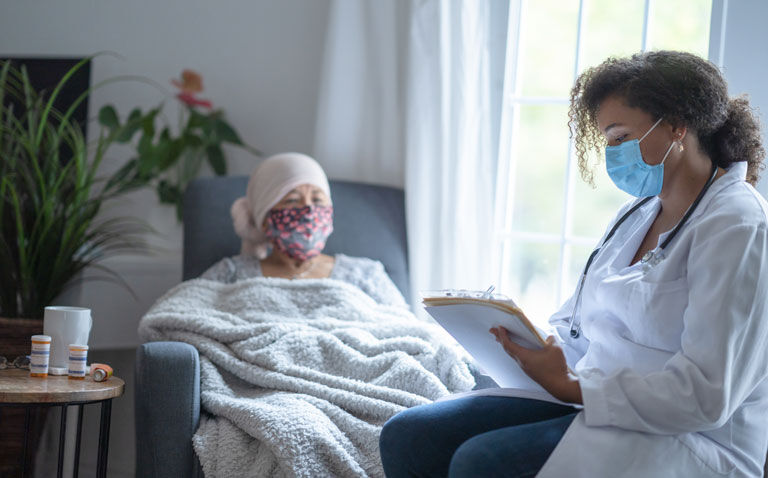Cancer patients with COVID-19 have a greater risk of both hospitalisation and death following infection compared with those without the disease
Cancer patients with COVID-19 have been found to be at a greater risk of hospitalisation and 30-day all-cause mortality compared to those without the disease according to the results of a study by a US team from Texas.
The presence of cancer has become a recognised factor that is associated with a higher risk for severe outcomes in those infected with COVID-19 and which is largely due to the presence of a compromised immune system.
During the early course of the pandemic, studies observed that a higher proportion of cancer patients infected with COVID-19 were both hospitalised and subsequently died, compared to those without the disease. In contrast, however, other studies have suggested that cancer and non-cancer patients have comparable COVID-19 outcomes after adjusting for age, sex, and comorbidity.
Furthermore, the impact of factors such as cancer treatments, different cancer types on COVID-19 related outcomes has been less well studied.
For the present study, the US researchers examined the association between cancer-specific characteristics and COVID-19 outcomes. They turned to the Optum de-identified COVID-19 electronic health record, which is derived from over 700 hospitals and 7000 clinics across the USA. Using these data, the researchers examined the outcome of those with a laboratory confirmed COVID-19 and a recorded cancer diagnosis.
The primary objective was to determine the effect of cancer on COVID-19 outcomes including 30-day all-cause mortality, hospitalisation, intensive care unit (ICU) admission and ventilator use. These outcomes were also analysed by the nature and type of cancer in comparison to patients without cancer.
The authors the explored if there were any other specific factors in those with cancer which impacted on COVID-19 outcomes.
Cancer patient with COVID-19 and related outcomes
A total of 271,639 patients with confirmed COVID-19 of whom 18,460, with a mean age of 66 years (45.3% male) had a cancer diagnosis were analysed. Among those with cancer, 8034 patients had a history of cancer for longer than 12 months and 10,426 had a more recent diagnosis, i.e., within 1 year before COVID-19.
30-day all-cause mortality was more than three times higher among those with cancer (6.8% vs 1.9%) compared to non-cancer patients. After adjustment for age, sex, ethnicity and risk factors, the presence of cancer was associated with a 7% higher risk of death (relative risk, RR = 1.07, 95% CI 1.01 – 1.14, p = 0.028) compared to those without the disease.
Similarly, there was a 4% higher risk of hospitalisation (RR = 1.04, 95% CI 1.01 – 1.07, p = 0.006). When comparing the duration of cancer, those with a recent diagnosis had both a significant (p < 0.001) increased risk of mortality (RR = 1.17) and hospitalisation (RR = 1.10) although this risk was non-significant for those who had cancer for much longer.
There was also an increased mortality risk for those with recent metastatic (RR = 2.09), solid tumour (RR = 1.12) and haematological (RR = 1.48) cancers compared with those without the disease. Individual cancers with a significantly elevated risk were leukaemia (RR = 1.58), liver (RR = 2.46), lung (RR = 1.85) and pancreatic (RR = 1.94).
When exploring the factors related to COVID-19 mortality in those with recent cancer, both chemotherapy (RR = 1.37) and radiotherapy (RR = 1.83) within 3-months before COVID-19, were significantly associated with a higher risk of death as was increasing age (i.e., > 75 years) (RR = 6.69).
In addition, the only significant co-morbidities were cardiovascular disease (RR = 1.72), diabetes (RR = 1.39) and renal disease (RR = 1.51).
Citation
Kim Y et al. Characterizing cancer and COVID-19 outcomes using electronic health records PLoS One 2022










